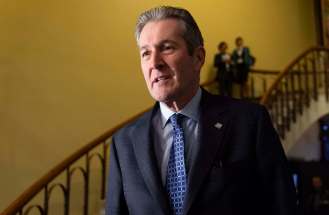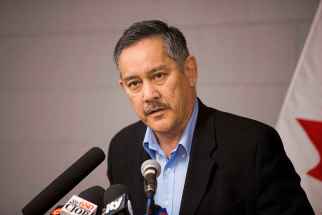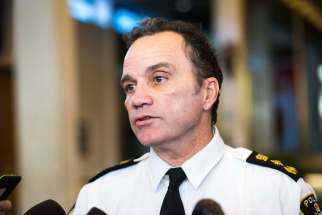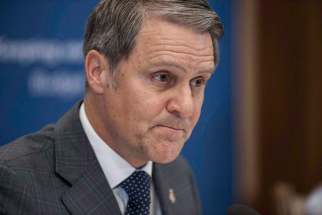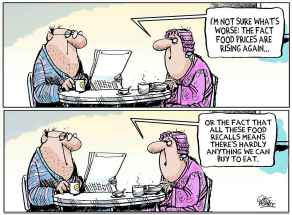First ministers meeting ‘productive,’ trade barrier-focused Pallister says
Read this article for free:
or
Already have an account? Log in here »
To continue reading, please subscribe:
Monthly Digital Subscription
$0 for the first 4 weeks*
- Enjoy unlimited reading on winnipegfreepress.com
- Read the E-Edition, our digital replica newspaper
- Access News Break, our award-winning app
- Play interactive puzzles
*No charge for 4 weeks then price increases to the regular rate of $19.00 plus GST every four weeks. Offer available to new and qualified returning subscribers only. Cancel any time.
Monthly Digital Subscription
$4.75/week*
- Enjoy unlimited reading on winnipegfreepress.com
- Read the E-Edition, our digital replica newspaper
- Access News Break, our award-winning app
- Play interactive puzzles
*Billed as $19 plus GST every four weeks. Cancel any time.
To continue reading, please subscribe:
Add Free Press access to your Brandon Sun subscription for only an additional
$1 for the first 4 weeks*
*Your next subscription payment will increase by $1.00 and you will be charged $16.99 plus GST for four weeks. After four weeks, your payment will increase to $23.99 plus GST every four weeks.
Read unlimited articles for free today:
or
Already have an account? Log in here »
Hey there, time traveller!
This article was published 07/12/2018 (2566 days ago), so information in it may no longer be current.
MONTREAL — Premier Brian Pallister is challenging his colleagues to come forward when they’re responsible for the patchwork of laws and regulations that impede economic growth.
“What we have to start doing is being more transparent as provincial leaders on what we’re doing and what we’re not doing. And if some of the premiers don’t want certain regulatory changes, they can say so,” Pallister said as he left meetings with the other 12 premiers and Prime Minister Justin Trudeau in Montreal.
While other premiers focused on the federal carbon tax and Alberta’s plunging oil price, Pallister said his months-long push to break down barriers to interprovincial trade is bearing fruit. He also said Ottawa is hinting at support for a transmission line to send some of Manitoba’s hydro power to coal-dependent neighbour Saskatchewan.
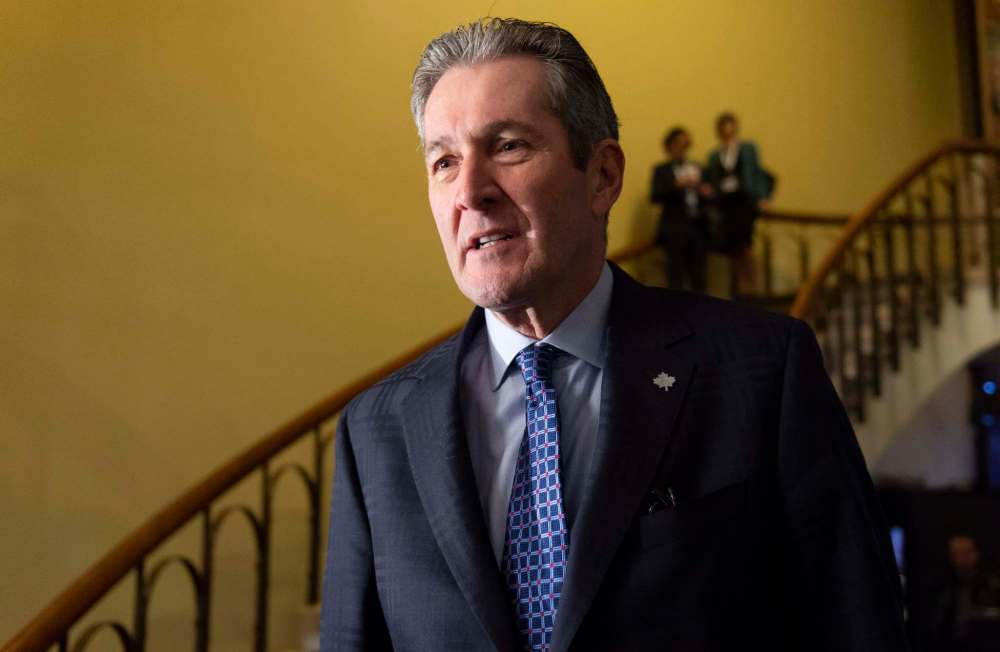
While he voiced support for helping Alberta get its oil to market and briefly decried the federal carbon tax, Pallister struck his own path Friday by homing in on trade rules and requirements that vary by province.
Statistics Canada estimated last year those barriers have Canadians paying what’s effectively a 6.9 per cent tariff on goods brought from another province.
“I wanted these things resolved 20 years ago. That being said, we’ve made more progress in recent months than we’ve made in long, long time as a country,” Pallister told the Free Press.
In July, Ottawa and the provinces identified 23 issues for their departments to sort through, but postponed dealing with trucking requirements, such as fuel permits and the timelines for semi-trailer registration.
“Some of our trucking companies, I’m told, have had to change tires at provincial borders. Just crazy stuff,” the premier claimed.
The trucking industry has a strong foothold in Manitoba, and Pallister said he “should have something to announce fairly quickly” around harmonizing their tire regulations.
Pallister pointed out that territories will likely need their own rules, because their roads are constructed differently than the provinces. For him, it’s an example of legitimate differences that some jurisdictions will have to hold onto while others cut red tape that doesn’t serve a purpose.
“Each of these things on their own don’t sound like a big deal, but they add up. And there are hundreds and hundreds of these types of impediments.”
“Perfection’s been the enemy of the achievement of any real progress,” he said, “because when you need everybody to agree, they don’t.”
Feds may alter environmental-review law, amid channel-outlet concerns
MONTREAL — Premier Brian Pallister is facing down some opposition in his push to have Ottawa fast-track Interlake flood-prevention channels, a topic he raised in meetings Friday with all 13 premiers and Prime Minister Justin Trudeau.
MONTREAL — Premier Brian Pallister is facing down some opposition in his push to have Ottawa fast-track Interlake flood-prevention channels, a topic he raised in meetings Friday with all 13 premiers and Prime Minister Justin Trudeau.
In a discussion about regulations and red tape, Pallister brought up the Lake Manitoba and Lake St. Martin flood-prevention channels, which Ottawa has supported but flagged for a thorough environmental review.
Pallister has warned that looming reform of reviews of that kind could ensnare the project. Bill C-69 aims to clarify the scope of reviews and include the role of Indigenous communities.
Saskatchewan Premier Scott Moe said Ottawa will consider amending tis legislation, even though it’s already under Senate debate.
“The commitment we have today is that the federal government will work with the provinces, as they move forward with that regulatory framework. We look forward to that, and that is new.”
Among those raising concerns about the $540-million outlet channels is Manitoba Metis Federation head David Chartrand, who took part in an early Friday audience between Trudeau and Indigenous leaders, which the premiers later joined.
Ottawa has invited MMF to weigh in on the case. Chartrand said in an interview he plans to raise the risk of zebra mussels and competing fish species flowing through those outlet channels, and the chance this will devastate Métis settlements that rely on fishing for food and their income.
“If we don’t do a proper study, are we going to try and fix it 20 years later, and find out we’ve caused so much eco-damage that we can’t reverse it? There’s too many unknowns,” he said. “We need proper consultation.”
Meanwhile, Chartrand said he is also trying to get premiers on board for what he said will be a construction bonanza, thanks to federal dollars to build homes, daycares and schools in Métis settlements. He said premiers from British Columbia and Saskatchewan expressed an interest, but Pallister did not.
“It’s good for Manitoba, it’s good for me; we’re going to be paying taxes,” he said. “We’re bringing to you a gold platter full of goodies. And you’re not even opening the door to let us bring it in.”
—Dylan Robertson
Pallister also said Ottawa seems open to supporting a project that aims to send some of Manitoba’s hydro into Saskatchewan; he said Trudeau was “excited” the idea of “a hydro pipeline” spanning — at least — from Quebec to Saskatchewan.
In late October, Manitoba Hydro inked the largest of three recent deals with SaskPower to send electricity to the neighbouring province for two decades beginning in 2022, through a transmission line announced in 2015.
Saskatchewan Premier Scott Moe didn’t give any details on what Ottawa said, but explained that the discussion came in the context of Alberta’s struggles to get oil to market and the need to better link and export all forms of energy.
“We talked about the opportunities for corridors between our nation for all energy products,” he said. “It’s incumbent on us to maximize that value.”
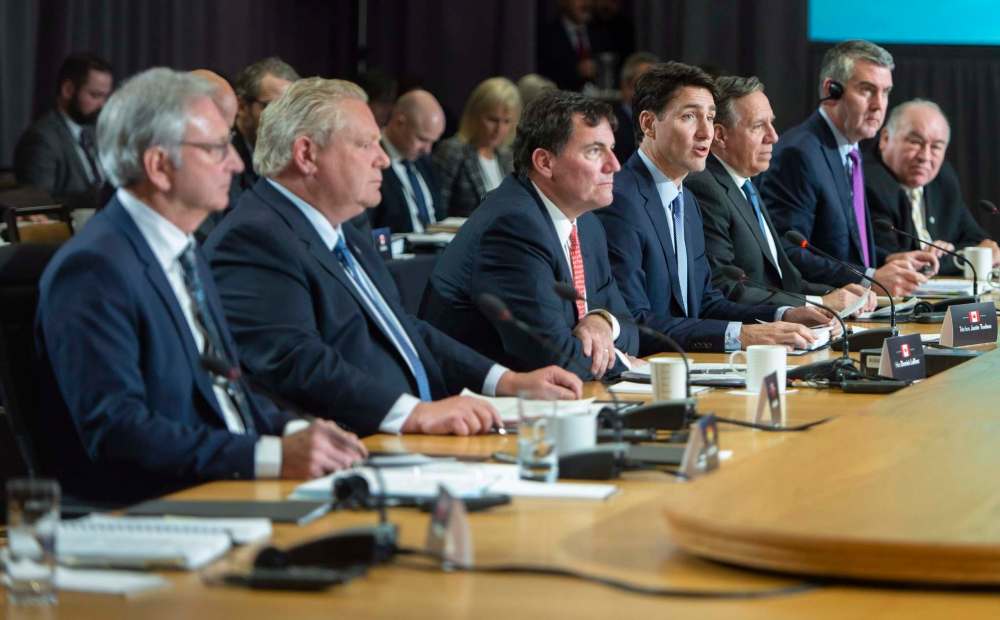
The premier said in a teleconference with reporters that it was a “win, win, win” for weaning Saskatchewan off coal-fired power, providing Manitoba an outlet for its excess hydro production and helping Ottawa meet its carbon-reduction targets.
“We’ll be pursuing that with enthusiasm,” he said.
Meanwhile, Pallister had little to say about the federal carbon tax, which Ottawa will impose on Manitoba next year after the premier scrapped his own flat tax two months ago.
“I’m not interested in having a fight with the prime minister today on this issue. But ultimately we have to agree to disagree on this approach,” he said.
On the eve of the meeting, media focused on premiers threatening to walk out or, in one case, dismissing federal briefings as “fluff.”
The acrimony seemed to dissipate Friday, although Ontario Premier Doug Ford slammed Ottawa, claiming it had moved its climate-change goalposts by asking Ontario to cut more greenhouse-gas emissions.
Premiers otherwise seemed content, but pointed to little concrete progress on virtually any issue.
Pallister said it was a productive six hours of discussion.
“The prime minister’s a congenial human being and he I think did an admirable job of building on that goodwill as we went through the meeting,” he said.
“The reality is: we’re thinking people, so we’re not always going to agree.”
dylan.robertson@freepress.mb.ca
History
Updated on Friday, December 7, 2018 5:07 PM CST: Update

